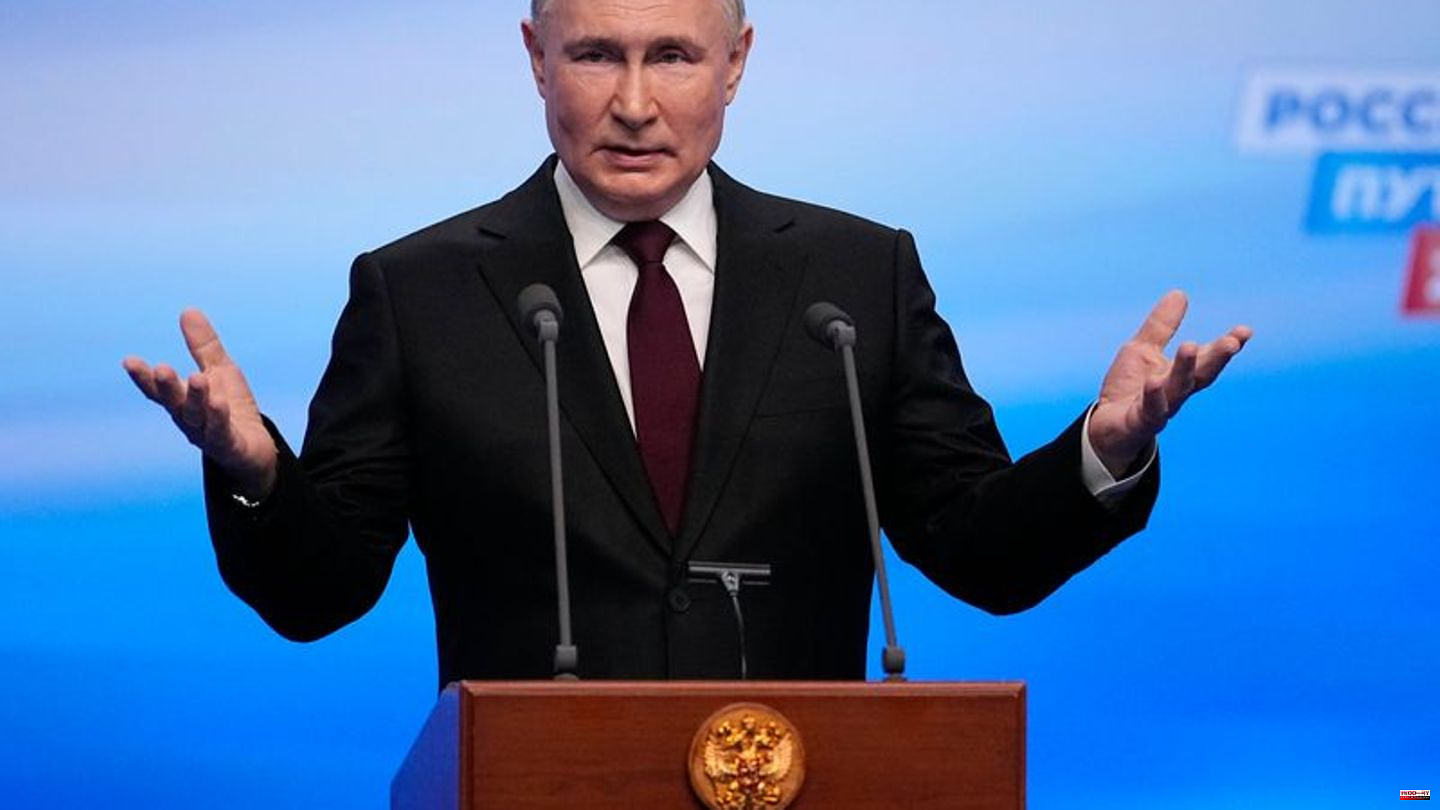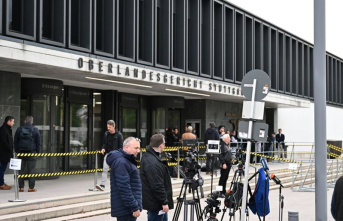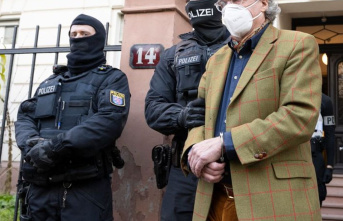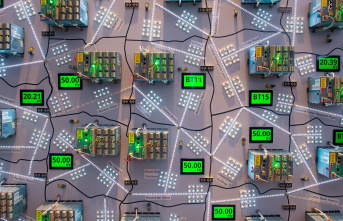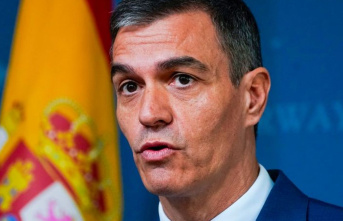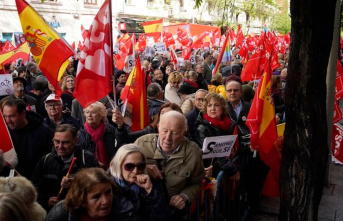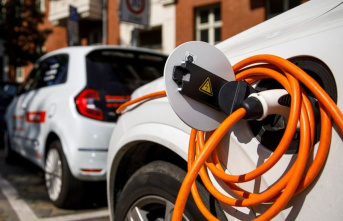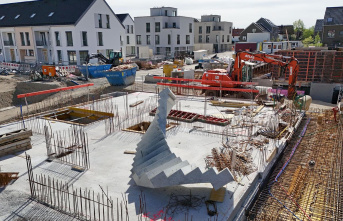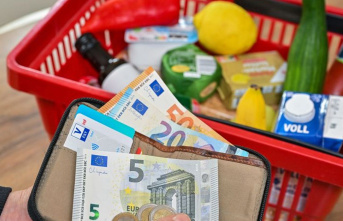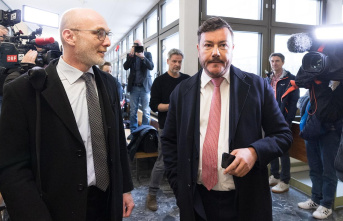After a presidential election that was accompanied by allegations of manipulation, Russia's election commission has awarded Kremlin chief Vladimir Putin a record result of just over 87 percent of the vote. After counting almost 50 percent of the votes cast, Putin has a share of 87.34 percent, as Russian media reported from the Central Election Commission. This means that the 71-year-old Putin gained more than ten percentage points compared to the 2018 election (76.7 percent). It is considered the best result he has ever achieved as he begins his fifth term in office.
Voter turnout was reported at over 74 percent - also a record. It is the highest number in a Russian presidential election. However, critics pointed out that it was only achieved through repression, coercion and fraud.
In his first statement on Sunday evening, Putin viewed the result as a sign of the citizens' trust and their hope that the government would do everything as planned. At the same time, he emphasized that he wanted to do everything in his power to fulfill the tasks set for the leadership, as the state agency Tass further reported.
Observers described the vote, which was accompanied by protests, as undemocratic because no real opposition candidates were allowed. In addition, there is no freedom of assembly in Russia; the Kremlin-controlled media is in line. Independent media are politically persecuted. Dissenters who criticize Putin's war against Ukraine or the power apparatus risk punishment and even imprisonment.
Putin is likely to present such a result as confirmation of his anti-Western and authoritarian course. Observers expect that over the next six years in office he will not only step up his foreign policy significantly in his war of aggression against Ukraine. Many Russians fear a new mobilization of hundreds of thousands of reservists.
Domestically, the thumbscrews in the country could also be tightened significantly in order to stifle the protests from Putin's opponents that were visible on the three election days. Tax increases have also been announced to finance the high expenditure on the war and social policy projects.
Election Commission reports record turnout in the middle of war
The voter turnout of more than 74 percent, the highest ever in a Russian presidential election, is intended to give the result additional legitimacy. The number of eligible voters was given as 114 million people.
The vote, which was scheduled to last three days, was also overshadowed by Putin's war against Ukraine, which he repeatedly portrays as a fight against NATO and the West's alleged desire for supremacy. This caught the attention of many Russians.
The Kremlin chief, who has now been elected for another six years, is likely to use the result as a clear incentive to wrest even more territory from Ukraine. Putin has announced that he will completely take over the previously partially occupied Ukrainian regions of Luhansk, Donetsk, Kherson and Zaporizhia. Odessa in the south is also threatened with a Russian occupation attempt.
Ukraine denies legitimacy to Putin's election
In the occupied parts and on the Black Sea peninsula of Crimea, which was annexed by Russia in 2014, people also voted in the election, which Putin opponents criticized as a farce. Ukraine and other countries reject the vote, which was organized in violation of international law, as illegal and meaningless. The Foreign Ministry in Kiev called on the international community not to recognize the results.
Ukrainian President Volodymyr Zelensky denied Putin “any legitimacy.” “This election fraud has no legitimacy and cannot have any,” said Zelensky in his evening video address broadcast in Kiev. "This figure (Putin) must end up in the dock in The Hague - we must ensure that, everyone in the world who values life and decency." There is an arrest warrant issued by the World Criminal Court in The Hague against Putin because of allegations of war crimes in Ukraine.
Reports of systematic fraud
Independent observers pointed to systematic fraud behind this high value for Putin. Since the first day of voting on Friday, a large number of cases have been documented in which employees of state-owned companies were pressured to vote and in some cases even had to take photos as evidence of their completed voting slip. Critics also complained that the online process in particular was easy to manipulate. Observers also documented the mass stuffing of pre-filled ballot papers into the ballot boxes.
Tightening of the thumbscrews is expected in the country
In addition to an even more brutal approach to the attack on Ukraine, experts expect an increase in repression in Russia after the controversial election. There is already no freedom of assembly or free reporting by the media; dissidents face imprisonment if they criticize the war or the power apparatus. Above all, the opposition has been eliminated because leading figures are in prison camps or have fled into exile abroad. Hopes for political change in Russia were recently dashed after the death of Kremlin opponent Alexei Navalny.
This lack of freedom in Russia and the synchronization of the media controlled by the Kremlin are seen as the most important basis for Putin to defend his power. However, political scientist Tatjana Stanovaya expects increasing problems for the Kremlin to keep a firm grip on the reins of power. Putin's positions are unbalanced, the goals of the war are unclear; and there are noticeable interventions in private life, wrote Stanovaja in an analysis for the Carnegie think tank. "All of this will inevitably create pressure on the regime from within," she said. "This does not mean that the regime will collapse or that there will be mass protests." But the influence of the elites will grow and Putin's importance will decrease.
Protest against Putin's new term in office
Thousands of opponents of the long-time president accompanied the vote, which was organized with a heavy hand by Russia's power apparatus, with a remarkable wave of protests. Despite attempts at intimidation by the authorities, on the last day of the election on Sunday in many cities across the country across eleven time zones, people gathered in front of their respective polling stations around 12 noon local time for the "Lunch against Putin" campaign, which brought together the opposition around Navalny, who died in a prison camp a month ago had called.
On Sunday, people also brought flowers to the Moscow grave of Navalny, who himself wanted to become president. Navalny's widow caused a stir in Berlin: Julia Navalnaya took part in a protest there.
This silent form of resistance was intended to give Kremlin and war opponents in Russia a safe opportunity to express their displeasure with this election, which critics have classified as undemocratic. Civil rights activists nevertheless reported dozens of arrests.
In front of a polling station in central Moscow on Ukrainski Boulevard, the tension during the action was literally palpable. The people came, even though in Russia there are severe penalties for even the smallest of protests. Moscow's public prosecutor's office had expressly warned against taking part in this action and threatened punishment for "extremism". A 64-year-old told the German Press Agency: "We want to express our protest - against the war, against the regime, against all of that."
Disrupting Putin's election by attacking Russian territories
The opposition politician Boris Nadezhdin, who was excluded from the vote, also took part in the protest. Opposition members were not even allowed as candidates in the ballot. Putin's three competitors were seen as mere personnel who either supported him directly or were at least aligned with the Kremlin.
Numerous people also took part in the actions in many other Russian cities. The well-known Navalny confidant Leonid Volkov spoke from exile of an "explosion" of resistance against Putin's continued rule, which the Kremlin will probably celebrate pompously on Red Square this Monday.
Meanwhile, on this final day of voting it became clear once again that in Russia's war of aggression against Ukraine, not everything is going according to plan as the Kremlin likes to claim. In southern Russia, a drone attack caused a fire at an oil refinery. As in previous days, the western Russian border region of Belgorod was bombarded with rockets. According to official information, a 16-year-old teenager died.
Political scientist Stanovaya

